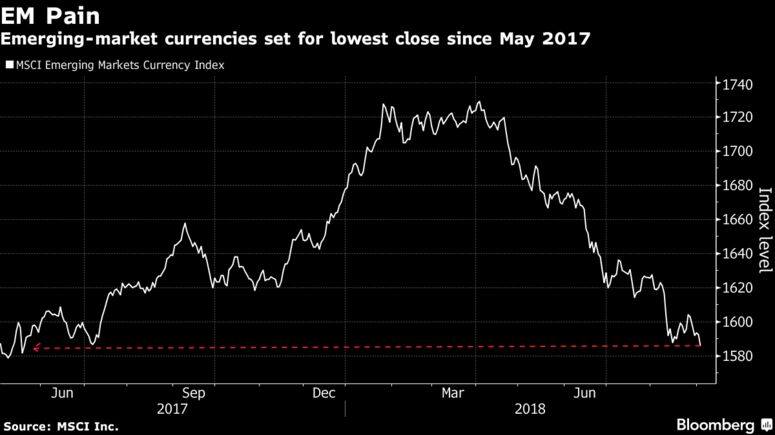
-
Rand sinks as South Africa enters recession in second quarter
-
Developing-nation currencies set for lowest since May 2017
Emerging markets sold off anew Tuesday as South Africa entered a recession and Indonesia’s rupiah joined currencies from Turkey to Argentina in tumbling toward record lows, reinforcing concern that contagion risks are too big to ignore.
MSCI Inc.’s index of currencies dropped for a fifth time in six days, set for the lowest close in more than a year. The rand led global declines as data showed the economy fell into a recession last quarter. Turkey’s lira slid on worry the central bank will disappoint investors at its rate meeting next week, while the Argentine peso slumped to a record and Indonesian rupiah sank to the lowest in two decades even after the central bank intensified its fight to protect it.

The dollar extended its advance to a fourth day as Donald Trump threatened to ramp up a trade dispute with China with an announcement of tariffs on as much as $200 billion in additional Chinese products as soon as Thursday. As U.S. rates rise, investor fears over idiosyncratic risks in emerging markets have climbed, including Argentina’s fiscal woes, Turkey’s twin deficits, Brazil’s contentious elections and South Africa’s land-reform bill.
Meantime, the dollar is winning by default, according to Kit Juckes, a global strategist at Societe Generale SA.
“There’s not much to make me think the dollar should be going up, but there’s plenty to make me nervous about other currencies,” Juckes said. “The dollar is very strong and lacking rate support, but other currencies are worse.”
| HIGHLIGHTS: |
|---|
|
|
|
|
|
|
|
READ: JPMorgan Survey Shows How Quickly Emerging Markets Can Unravel
Here’s what other analysts are saying about the latest in emerging markets:
It’s Not Enough
Tsutomu Soma, general manager for fixed-income trading at SBI Securities Co. in Tokyo:
- “The measures announced by Argentina and Turkey are probably not enough to lead to a significant improvement in their fundamentals”
- “Contagion risks to other emerging markets are growing especially as the Fed tightens”
‘Set to Suffer’
Michael Every, head of Asia financial markets research at Rabobank in Hong Kong:
- “Emerging-market FX are set to suffer almost regardless of what they do, the only issue is how much”
- The dollar will remain on the front foot against emerging markets as long as the U.S. continues to raise rates and boost fiscal spending while keeping the trade war fears on the radar
‘Further Pain’
Lukman Otunuga, research analyst at FXTM:
- “Emerging market currencies could be destined for further pain if the turmoil in Turkey and Argentina intensifies”
- “The combination of global trade tensions, a stabilizing U.S. dollar and prospects of higher U.S. interest rates may ensure EM currencies remain depressed in the short to medium term”
‘A Penny Short’
Stephen Innes, head of Asia Pacific trading at Oanda Corp. in Singapore:
- Argentina’s measures are “likely a day late and a penny short”
- “These moves are a step in the right direction, but they’re unlikely to be convincing enough to remove currency speculators from the driver’s seat. I guess it’s all down the IMF’s ‘White Knight’ to the rescue. However, we are getting into the realm of unquantifiability which makes the market utterly untradable”
Most Vulnerable
Masakatsu Fukaya, an emerging-market currency trader at Mizuho Bank Ltd.:
- Contagion risks from Argentina and Turkey are growing for other emerging markets and economies with weak fundamentals such as those with current-account deficits and high inflation rates
- Currencies of countries such as Indonesia, India, Brazil and South Africa have been among most vulnerable
- The Fed’s rate increases and trade frictions means the underlying pressure on emerging currencies is for a further downward move
— With assistance by Tomoko Yamazaki, Yumi Teso, Lilian Karunungan, and Ben Bartenstein
***
More Emerging Market Chaos – How Long Before It Spreads To The Developed World?
Emerging market chaos is now front page news.


